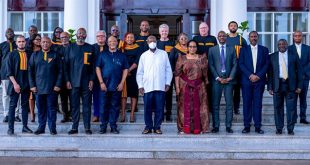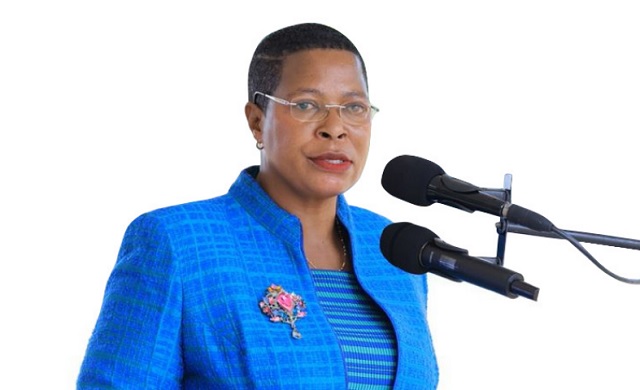
LOP Ssenyonyi under siege as parliament moves from Kampala
COVER STORY | IAN KATUSIIME | In her two year tenure following corruption scandals and international sanctions, under pressure Speaker Anita Among has had to adopt various strategies to cope and survive.
Her latest gambit, as the precincts of parliament remain sealed behind security barricades since the July 23 #March2Parliament protests, is to hold parliamentary sittings away from Kampala; in the northern Uganda city of Gulu.
According to the Speaker’s team, the change of location is part of a grand plan to have sittings of parliament held in all regions of the country; north, south, west and east.
It is a move packed with symbolic value and has been mooted over a long time without actualisation. In typical Anita Among style, it is surrounded by allegations of corruption and misuse of public money.
Each sitting will reportedly cost Shs5 billion which is the equivalent of the annual budget of many government ministries and departments. The Speaker and her surrogates have denied each sitting will cost Shs5 billion but they have not disclosed how much it will cost. This lack of transparency about the cost has spawned the allegations of corruption.
The Deputy Speaker of Parliament, Thomas Tayebwa, who has been chairing sessions recently has also denied allegations that Parliament will spend that much on the sitting in Northern Uganda.
Tayebwa said the Rules of Procedure of Parliament give the Speaker powers to determine where Parliamentary sittings can be held arguing that Parliament has in the past held sessions at Serena Hotel and Kololo Independence Grounds. He added that on those occasions, MPs never sought to change venue. But he too, despite his spirited defence of the move, did not reveal the cost taxpayers will incur for the sitting in Gulu. Observers say this is typical of how parliament spends money.
Although parliament has always talked of regional sittings, the timing could not be more convenient for a House that is under siege from protestors and mounting criticism from the public for corruption, misuse of public resources, and extravagance.
Ssenyonyi’s catch-22
According to parliament, holding plenary sessions in other parts of the country is meant to highlight local issues but the decision has been met with criticism.
The Leader of Opposition in Parliament (LOP) Nakawa West MP Joel Ssenyonyi who is leading the charge has lambasted the House leadership for locking him out of the preparations. He has accused the Speaker of extravagance and wastage of money, citing the Shs5 billion.
“What do the people of northern, western, and eastern Uganda want?” he says, “What these people want is medicine in their hospitals, good roads, infrastructure that works.”
The entry of Ssenyonyi, a first term MP, has changed the Speaker-LOP dynamic. Ssenyonyi has been an unrelenting critic of Speaker Among since he assumed office in January. In turn, the Speaker has locked him out of Parliamentary Commission meetings.
Ssenyonyi has complained about the Commission informing him at the eleventh hour and then asking him to mobilise opposition MPs. The decision has given the parliament’s administrative organ a sharp partisan bent.
Former Leader of Opposition Mathias Mpuuga is in the bulls eye of a censure motion for taking home Shs500m for a service award that was denounced as irregular for the way it was passed. In total, him and other parliament commissioners pocketed Shhs1.7bn are staring at censure and could still face prosecution for what has been termed as ill-gotten funds.
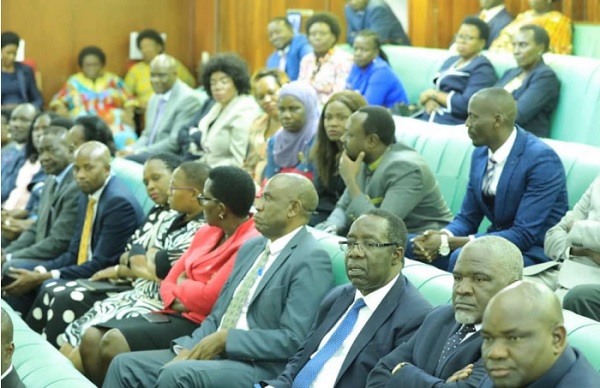
Mpuuga in his two and a half year gig as LOP was a friendly figure who avoided direct criticism of the Speaker.
Among kept some of the privileges extended to Mpuuga when the National Unity Platform (NUP) fired him as LOP and replaced him with party spokesman Ssenyonyi. Among also protected Mpuuga’s former staff by retaining them in parliament.
Whether his views are correct or not, Ssenyonyi appears to have landed in a well prepared trap.
As he should have known, his opposition has met with backlash from MPs from northern Uganda where the first sitting is to be held.
In their caucus, the MPs said this is an opportunity to address issues in the north and some have said Ssenyonyi as LOP has not visited the area. The MPs also argue that hosting the MPs and the entourages in the area will boost local business, including hotels, restaurants, and recreational places.
What has remained unsaid is that the MPs going to Gulu and their entourages are entitled to out of office allowances. This has divided the House. It has also been framed as a pro-corruption versus anti-corruption issue
According to experts, this is typical. In an essay entitled “Protests in Kenya and Uganda highlight corruption at the top – but political elites don’t give in without a fight”, Prof. Inge Amundsen a Senior Researcher at the Chr. Michelsen Institute in Norway argues that what MPs and other political elites engage in is “political corruption”.
He says compared to its cousin, administrative or bureaucratic corruption (such as a civil servant soliciting a bribe to provide a public service), political corruption is much more difficult to fight.
He says this is because it is perpetrated by people who hold political power and influence.
“This class can fight back,” he says, “Corruption gives them both the incentive and the means to hold on to power.”
According to him, political corruption takes place at the highest levels of the political system. It involves decision-makers who have the power to define the “rules of the game” and to make the laws.
They include politicians elected (or nominated) to parliament, government ministers and politically nominated senior civil servants.
Amundsen is a political scientist focusing on political corruption, democratic institutionalisation, political economy, parliaments, and political parties. So he understands thw workings of corruption, globally. His main study areas, however, are Angola, Malawi, Palestine, Bangladesh, Nigeria, and Ghana.
Amundsen argues that the recent protests in Uganda and Kenya offer an opportunity to examine what the African anti-corruption movement is up against. “Anti-corruption is politics,” he says, “Illiberal leaders can use it to target political opponents and rivals as well as the media, civil society and activists.
“Anti-corruption can be used to bolster the legitimacy of corrupt leaders by `frying some small fish’, like the lower bureaucracy or certain socio-cultural groups.”
He says, in fact, the corrupt can refocus the fight against corruption to target the business dealings of their rivals.
Amundsen is also argues that “corrupt practices are tolerated when carried out by or serving the interests of the power holders. These include gift-giving, vote buying or handouts, special remuneration and advancement for loyal bureaucrats.
It is also alleged, for example, that at the height of the #March2Parliament protests, Speaker Among provided a list of organisations and activists to President Museveni describing them as the “funders of the movements”. This is according to people who were informed on her decision.
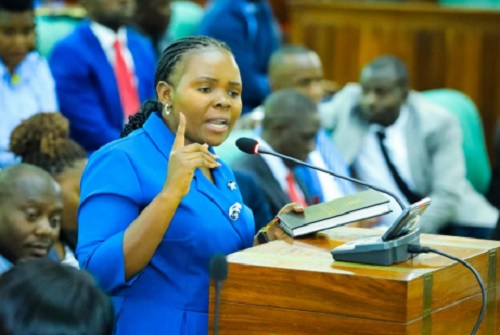
Speaker Among has shown an impeccable adroitness to use the rules to her advantage. Her decision to shift the sitting to Gulu may be viewed as opportunistic. But she is able to do it solely because she is constitutionally given the power to do it.
Under rule 10(1) of the rules of procedure for the parliament of Uganda, subject to the rules, the House can only “meet on such days and such place as the Speaker shall determine”.
Similarly, under part ii of the rules of procedure on meetings, sittings and adjournment of the house, the Speaker is given power to solely decide on the business of the House.
Rule 17. (1) says: “The Speaker shall determine the order of business of the House and shall give priority to Government business”.
Many Speakers do not have such power as the constitution gives Anita Among.
The sittings of the East African Legislative Assembly, for example, are held under the principle of rotation; moving from one capital to another of the member states of the EAC.
This is guided under Article 55 of the EAC Treaty. The rule also says EALA must meet at least once in every year at its headquarters in Arusha, Tanzania.
However, the same Article 55 says, “the meetings of the Assembly shall be held at such times and places as the Assembly may appoint”. It is the Assembly to decide, not the Speaker.
Similarly, under its rules of procedure, the European Parliament, also caters for sittings outside of the plenary seats in Brussels or Strasburg. Its rules require a majority vote for this to happen.
Pressure on Speaker
Among’s reign has been plagued by theft of funds, lavish spending and rebuke from donor nations who have slapped her with travel sanctions.
In the last eight months alone, the pressure on the Speaker has ratcheted up with the #March2Parliament protests, rumours of arrests, a censure motion on parliament commissioners, and mixed signals from President Yoweri Museveni who has pondered on how to deal with the scandal-ridden Speaker.
Museveni whom Among often cites as an ally, has also questioned her about her wealth and the financial impropriety. Leaks revealed that between July and October 2023, Among spent Shs7.9bn in corporate social responsibility—figures that would make corporate giants like banks and telecoms—swoon with envy.
The leaks under an anti-corruption expose at parliament reveal that she spent over Shs17 billion in the last year alone with money being wired on the accounts of her subordinates at parliament.
The repercussions were hard hitting. The UK used the Global Anti-Corruption Sanctions regime to slap a travel ban on Among and froze her assets.
Then-UK Deputy Foreign Secretary, Andrew Mitchell, in April announced sanctions on the Speaker and other profile Ugandan politicians charged with corruption.
It was the first time the UK government was using the Global Anti-Corruption Sanctions regime on individuals involved in corruption in Uganda.
Two ministers who while they were responsible for Uganda’s poorest region, Karamoja, were charged with corruption at Uganda’s Anti-Corruption Court, were subject to the travel bans and asset freezes.
The two former ministers sanctioned – Mary Goretti Kitutu and Agnes Nandutu – stole thousands of iron sheets used for roofing and infrastructure from a Ugandan government-funded project aimed at housing some of the most vulnerable communities in the region, providing them to prominent politicians and their families instead.
The UK said it sanctioned the Speaker of the Parliament Anita Among, because she “benefited from the proceeds”.
In May, the U.S. followed suit and sanctioned the Speaker and her husband, Budiope County MP Moses Magogo.
The U.S. announced it was imposing sanctions on some senior Ugandan officials over accusations of involvement in corruption or human rights abuses.
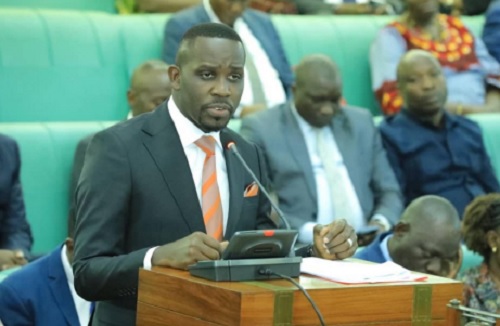
Among was one of four officials the US State Department said would face travel bans because of “significant corruption”.
Kitutu and Nandutu, and state minister for finance Amos Lugolobi were also named.
State Department spokesman Matthew Miller said in a statement the three had “misused public resources and diverted materials from Uganda’s neediest communities”.
“All four officials abused their public positions for their personal benefit at the expense of Ugandans,” he added.
According to commentators, Among has put the Ugandan government in a precarious position because the country has never had a Speaker with double sanctions from two major nations who are also major donors.
The sanctions from the U.S. and the U.K. have left the Speaker in limbo and made her a sitting duck. Unlike her predecessor, former Speaker Rebecca Kadaga, with whom incidentally she has had strained relations, Among cannot travel for international parliamentary conferences or represent the country at other important fora due to her status as a sanctioned individual.
Doubts have emerged on whether the besieged Speaker will make her annual pilgrimage to the Vatican later this month to commune with the Holy Father, Pope Francis in whom she has always sought refuge from the uproar back home.
Earlier, there were reports that a businessman with ties to Anita Among was unable to secure a visa from the Italian embassy in Uganda on a business trip as diplomatic pressure on the Speaker’s camp piled.
The unabated malfeasance at parliament sparked the March2Parliament protests where more than 100 people were arrested and charged. As a result, the Ugandan legislative house is a garrison under lock and key in fear of protestors storming it as has happened in recent popular revolts in Kenya, Bangladesh, Malaysia, and the U.S.
The Speaker is also facing growing opposition from within the House. The censure motion aimed at the four parliamentary commissioners is now on her desk having gathered the required amount of signatures for it to be debated on the floor of parliament.
Some MPs have boldly stood up and denounced Among. On the day of the protests Aringa South MP Yorke Alioni read Speaker Among the Riot Act in a plenary session chaired by Tayebwa. “The world is aware that there is corruption in this parliament. We want this matter to be debated? Why are you running away from this debate?”
He pummeled further: “You’re meant to be neutral to give space to all of us equally. Why are you making us suffer…running through this country looking for signatures to debate this matter of corruption in this parliament?
Alioni told Tayebwa and his boss Anita Among to come clean since they have been named several times in acts of corruption.
Regarding the shift to Gulu, Mawoggola South MP Gorreth Namugga says she does not agree with the regional sittings. “I know it is the discretion of the Speaker to gazette the sitting but the timing is not right. As opposition, we are disgruntled. The LOP has been totally left out of meetings and he has never been invited,” she told The Independent.
“With the current economic crisis, this is extravagance yet we have important statutory obligations,” Namugga said of the Speaker’s decision. “With the Shs5bn going into that sitting, we can instead prioritise and pay medical interns among other things,” she said.
Namugga said they are many issues facing Gulu that can be addressed from the House in Kampala such as absence of drugs in hospitals, lack of a mortuary.
She said parliament has tried to address issues pertaining to the north such as the Balaalo. “Parliament should use its powers of budget re-allocation to sort out some of the issues affecting the country. Parliament serves the people when it fulfills its mandate. Sitting in northern Uganda does not,” she said.
 The Independent Uganda: You get the Truth we Pay the Price
The Independent Uganda: You get the Truth we Pay the Price

